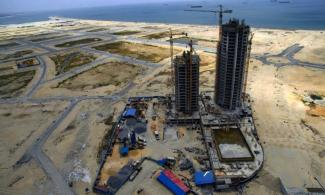
The coastal city of Lagos is the largest city in both Nigeria and all of Africa, with a metro area population of 21 million. It is one of only three mega-cities — cities with a population exceeding 10 million — in Africa, and one of the fastest-growing cities in the world. The rapid pace of Lagos’ growth means the city’s infrastructure hasn’t been able to keep up. Because of this, 70 percent of the city’s population lives in slums, which often reside over water. Some even call these slums the “Venice of Lagos.”
Despite these woes, Nigerian leaders see the city as a tremendous opportunity rather than an immense burden. The habitat program manager for Nigeria, Professor Johnson Bade Falade, said the situation in recent years has improved noticeably, saying that “a breath of fresh air has come over Lagos … the difference is clear, the evidence is the improved landscape of Lagos in the urban regeneration project.”
At the center of this regeneration project is the extremely ambitious and futuristic Eko Atlantic city. Eko Atlantic is planned to be situated over an artificial 10 square kilometer plot of land off of Victoria Island. The idea behind this project was to establish a city that will become the new economic capital of Africa, akin to cities like New York City and Shanghai, and to provide environmentally friendly housing for 250,000 and employ another 150,000.
The prospect of a modern, African Wall Street is understandably exciting for Nigeria’s leadership, which is still embroiled in conflict with Boko Haram. But despite all the potential that Eko Atlantic has, the consequences of the project have been largely been ignored. Instead, developers have spun the obvious problems with Eko Atlantic around, persecuting the city as a solution to Lagos’ problems, not an aggravator.

The most frequent criticism of Eko Atlantic is that it will be highly susceptible to rising tides, as it is based on an artificial sandbar directly adjacent to the ocean. In response, developers argued that the “whole purpose … is to arrest the ocean’s encroachment.” To prevent coastal erosion and flooding, the future city has been surrounded by an enormous concrete barrier, colloquially dubbed the “Great Wall of Lagos.” Supposedly, this barrier would defend all of Lagos from rising sea levels and the effects of climate change.
Climate scientists (you know — the people we should be listening to) contend this claim and instead suggest the wall will actually worsen the situation for surrounding areas. Storm surges that approach the new island might affect a neighboring island instead, according to climate change researcher Dr. Alan Blumberg. Couple this with the fact that the surrounding islands are actually lower in sea level than Eko Atlantic, and the planned city seems even more preposterous.
Therefore, critics have come to a second hypothesis — one that should have seemed obvious beforehand. Eko Atlantic is not a savior for the people of Lagos, but instead a future haven for the ultra-wealthy, where they can live unaffected by climate change.
Nigeria is a nation afflicted with immense inequality, and Lagos is no different. Sixty percent of Nigeria’s population lives on less than a dollar a day, and because of this, Nigeria’s leadership has decided to exacerbate the issue rather than attempt to take on an impossibly difficult crisis. This is often the case in developing countries because, in order to attract foreign investments, they must marginalize and conceal this vast population in poverty.
In Lagos, the government decided to clear out slums rather than improve them, claiming that they are riddled with crime and ought to be removed. In 1990, 300,000 homes were razed in Lagos to make way for high-end real-estate development. The government again went on a razing spree in July of 2012, destroying large sectors of the aquatic slum Makoko, giving residents just a 72-hour notice to evacuate. Makoko resident Paul Adiroba said at the time: “We can’t keep living like this. We are human beings, we are not animals.”
In the name of development, Lagos’ government is proceeding with these evictions. Eko Atlantic is merely the ultimate embodiment of the wealthy’s desires — a land entirely separated from both the poor of Lagos and the effects of rising sea levels. From their shining city, the rich may forget about those in need as not even the elements can hurt them anymore. This is the mindset that the neoliberal elite have taken with climate change and inequality: It would be too costly to fix these issues, so instead, we should seal ourselves off and forget they ever happened.
Welcome to Eko Atlantic, where you can forget the woes of the world. The Orwellian nightmare gets closer to reality every day.
Author: David Damiano